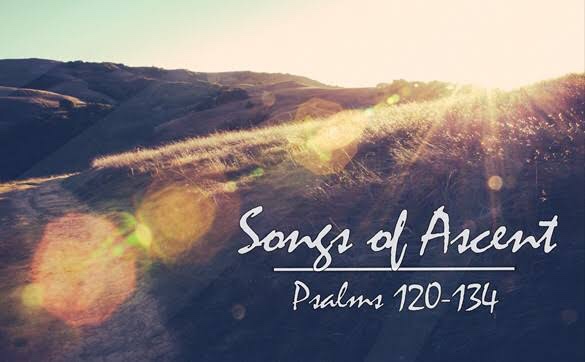During Holy Week, it is Christian tradition to trace the pathway which Jesus took towards Jerusalem, sometimes following the stories recounted in Mark 11-14. In the city of Jerusalem, Jesus was arrested, crucified and died; in this city, for untold years, pilgrims had gathered in festive celebration, to remember, to retell the stories, to nurture their faith, to seek the Lord.
In Jewish tradition, the pilgrims travelling towards the city would join in songs—some of which are included within the book of Psalms in Hebrew Scripture and Christian Bibles. On their journey towards the city, according to this tradition, the pilgrims would sing Psalms 120—134. These are known as The Songs of Ascent, for they were sung as the pilgrims climbed higher towards the city, and then higher still towards the Temple at the highest point in the city.
This series of blogs use these ancient songs as the focus for reflecting, to envisage what that journey was like for Jesus and his followers, travelling as pilgrims to the city to celebrate Passover.

It was during that week that everything came to a head.
A gathering of friends and family; a joyful occasion, with exuberant celebration, meeting up after months or years in our own villages. We had walked with other pilgrims, heading towards the city, climbing the road, singing the psalms, looking forward to the festival. We climbed, higher, nearer to the holy mount. Each stage along the way was matched with a psalm of ascent, singing with joy as we drew near to the holy place.
So we stood at the foot of the holy place, the Temple first built by Solomon, then rededicated and rebuilt in the time of Herod; the Temple where the Lord God dwelt, where he dwelt in the Holy of Holies.
And we prayed for one another, and we sang: The LORD bless you from Zion.
May you see the prosperity of Jerusalem all the days of your life. (128)
In the silence, reflect on Psalm 128
Yet when we came inside, into the court of the temple, there was no peace, no joyful singing, no celebration, no preparation for worship.
Instead: a whip of cords, a shout of anger, words of vengeance, judgement, rejection; tables overturned and coins scattered. A whip of cords, a shout of anger, tables overturned and coins scattered.
It was not a moment of peaceful reflection; it was a moment of fearsome agitation. So we sang, in fear: The LORD is righteous; he has cut the cords of the wicked. (129) In the silence, reflect on Psalm 129
and again, we sang, this time in hope: O Israel, hope in the LORD! for with the LORD there is steadfast love, and with him is great power to redeem. It is he who will redeem Israel from all its iniquities. (130) In the silence, reflect on Psalm 130
A gathering of friends and family; a joyful occasion, with exuberant celebration. We had walked with other pilgrims, heading towards the city,
climbing the road, singing the psalms, looking forward to the festival.
Each step closer to the city was a step that brought us closer to the heart of our faith. We climbed, higher, nearer to the holy mount. Each stage along the way was matched with a psalm of ascent, singing with joy as we drew near to the holy place. So we stepped out, full of faith, on our journey to Jerusalem.
It was during that week that everything came to a head.
See https://johntsquires.com/2021/03/28/holy-week-1-ascending-to-jerusalem-psalms-120-121/ and https://johntsquires.com/2021/03/29/holy-week-2-ascending-to-jerusalem-psalms-122-124/ and https://johntsquires.com/2021/03/30/holy-week-3-ascending-to-jerusalem-psalms-125-127/

